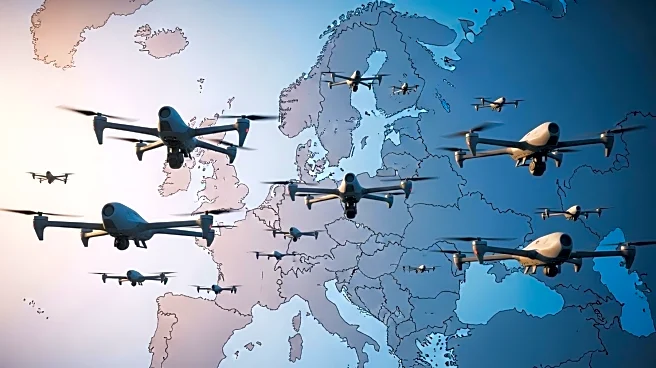What's Happening?
European leaders are currently debating the implementation of a 'drone wall' as a defense mechanism against Russian drone incursions. This proposal, supported by European Commission President Ursula von der Leyen, aims to protect Europe from increasing drone threats, particularly from Russia. The idea has gained traction following recent airspace violations in Poland, Romania, Denmark, and Norway, which have been attributed to Russian activities. However, the proposal has met with skepticism from key EU members such as France and Germany. German Defense Minister Boris Pistorius has expressed that there are more pressing defense priorities than the drone wall. The debate highlights a geographical divide within the EU, with frontline countries like Latvia and Lithuania supporting the initiative, while nations further from the Russian border, such as Italy and Greece, emphasize the need for a broader defense strategy that includes Europe's southern regions.
Why It's Important?
The discussion around the drone wall underscores the complexities of European defense policy in the face of Russian aggression. The divide among EU countries reflects differing security priorities based on geographical proximity to Russia. Frontline nations, which are more directly threatened, are pushing for immediate defensive measures, while others advocate for a comprehensive approach that addresses threats from multiple directions. This debate is crucial as it could shape the future of European defense strategies and the EU's ability to respond collectively to external threats. The outcome of this discussion could impact the security dynamics within Europe and influence the EU's stance in global geopolitics, particularly in its relations with Russia.
What's Next?
As European leaders continue to deliberate, the outcome of the Copenhagen summit will be pivotal in determining the EU's defense strategy. If the drone wall proposal is adopted, it could lead to increased investment in drone defense technologies and infrastructure. Conversely, if the proposal is rejected, the EU may need to explore alternative defense mechanisms. The ongoing discussions are likely to influence future EU defense policies and could prompt further negotiations among member states to reconcile differing security priorities. The response from Russia and other global powers will also be critical in shaping the EU's defense posture.
Beyond the Headlines
The debate over the drone wall also raises questions about the EU's ability to maintain unity in the face of external threats. The differing perspectives among member states highlight the challenges of achieving consensus in a diverse union. Additionally, the focus on drone defense reflects the evolving nature of warfare and the increasing importance of technological advancements in national security. This situation may prompt further discussions on the ethical and legal implications of using advanced technologies in defense strategies.









